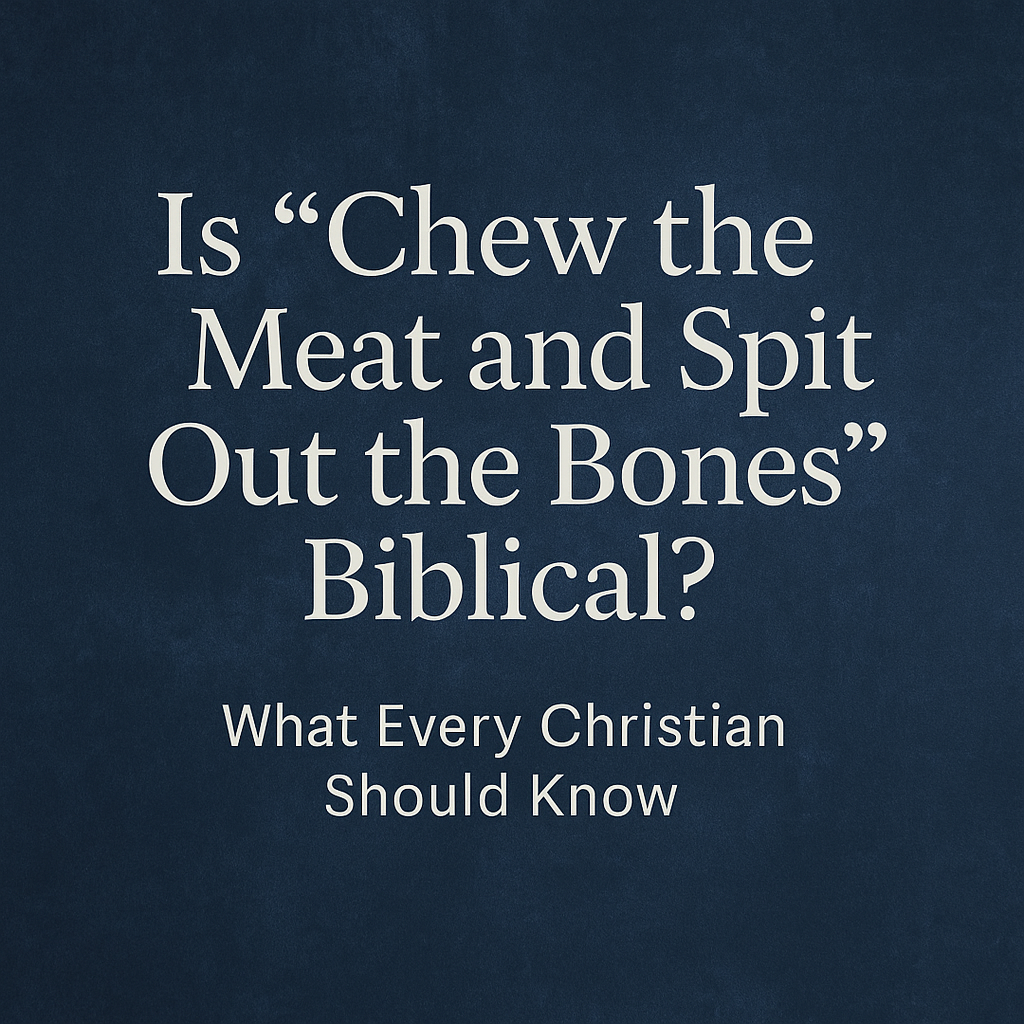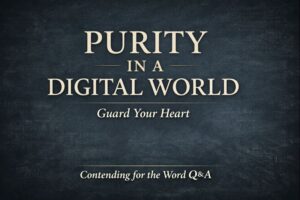⏱️ Estimated Reading Time: 9 min read
Introduction
I am very selective about joining Facebook groups. They can be notoriously overwhelming with the constant notifications and comment sections that make you regret ever sharing your opinion even if it’s about something as simple as your favorite restaurant. Still there are a couple of groups to which I belong that have been incredibly helpful when it comes to researching Christian authors. Recently though, I’ve noticed a piece of advice being offered in these groups and other online forums which has me concerned. A particular author, pastor or podcast host will be recommended with warnings about the content and the suggestion that we should “chew the meat and spit out the bones.”
Understanding the Phrase: “Chew the Meat, Spit Out the Bones”
What do they mean by that phrase? Well, it’s a catchy way of saying that we should take what is good and throw out what is bad. On the surface, this may seem like sound and even biblical advice. In fact, there are some who think that phrase does come from the Bible but, spoiler alert, it doesn’t.
When ‘Chew the Meat and Spit Out the Bones’ Falls Short: A Call for Biblical Discernment
As Christians we know that whether it’s social media, television, movies or books it is rare that we will find content to consume that represents a Biblical worldview. Most of us understand that we must exercise caution and discernment when we encounter subject matter coming from the secular world. 1 John 2:15-17 says, “Do not love the world or the things in the world. If anyone loves the world, the love of the Father is not in him. For all that is in the world—the desires of the flesh and the desires of the eyes and pride of life—is not from the Father but is from the world. And the world is passing away along with its desires, but whoever does the will of God abides forever.” We begin to love that which we consume which means that when we indiscriminately absorb the things of this world, we will find ourselves at odds with the Lord. Loving the world and loving God are incompatible. When it comes to content that is presented as ‘Christian’, many people will not feel the need to use that same degree of caution and discernment. Instead, it may be more likely that you will have fellow Believers accusing you of being judgmental or legalistic if you express concern over errors or heresy that might be present in a popular show, book, or even a sermon.
The Dangers of ‘Chew the Meat and Spit Out the Bones’ in Christian Content Consumption
Now, there’s an important distinction that needs to be made at this point. I am absolutely not advocating that people only read books that perfectly align with every opinion and viewpoint they have. This would almost assuredly prove to be impossible anyway. We should be people, as Christians who want to grow in biblical knowledge and understanding, which requires exposure to different ideas. And, within this context, there should be an element of chewing the meat and spitting out the bones with the idea that you are thinking through what is good and right from God’s Word and rejecting what isn’t biblical (Philippians 4:6-9; 1 Thessalonians 5:21). Say, for example, your child is given a biology textbook in their public school, and it presents the theory of evolution as factual. But the rest of the book has no other areas of concern. This is a situation where you know that since the book is presented from a secular worldview it will have some bad mixed in with the good. Now you are presented with an excellent opportunity to have conversations with your child about what the Bible says, how we can know that it’s true, and how all of that relates to their lives as young people.
Is ‘Chew the Meat and Spit Out the Bones’ Biblical? Evaluating a Common Christian Adage
At this point, the logical question you might ask is why that same standard can’t be applied to content that is promoted as Christian. After all, it says in 1 Thessalonians 5:21 to “test everything; hold fast what is good.” This sounds an awful lot like “chew the meat and spit out the bones”, doesn’t it? But Paul had something very particular in mind when he gave these instructions to the church at Thessalonica. 1 Thessalonians 5:21 follows the guidance earlier on in the chapter on the handling of prophecies (1 Thessalonians 5:20). Paul is reminding them in 1 Thessalonians 5:21 of the importance of testing every prophetic word (and everything they hear) to confirm that it was indeed from the Lord, so there was no allowance made for so-called prophets (or anyone else teaching God’s Word) to get things “mostly right”. Holding fast to the good (1 Thessalonians 5:21) meant an outright rejection of that which was bad and not giving even an inch when there was error. Additionally, Paul commends the Thessalonians earlier in 1 Thessalonians 2:13 for understanding that while Paul brought them the Word it was not ultimately about Paul but about the Word of God at work in and through Paul and at work in them also. Further the illustration that Paul gives about all of these points is in Acts 17:11 where Paul as an Apostle commended the Bereans for “searching the Scriptures to see if these things are so.” The point here: Get in your Word, search the Scriptures, exercise discernment, and use resources only from trusted and faithful ministries that love the Word, the Church, and people.
Guarding Your Faith: Why ‘Chew the Meat and Spit Out the Bones’ Isn’t Always Wise Advice
While Paul is specifically talking about the handling of prophecies in 1 Thessalonians 5:20, we have countless other warnings about false teaching and the importance of exercising discernment (Matthew 7:15-20; 2 Peter 2:1-2; 1 Timothy 6:3-5; 1 John 4:1-3; 2 Corinthians 11:13-15; Galatians 1:8-9). 2 Peter 2:1-3 says, “But false prophets also arose among the people, just as there will be false teachers among you, who will secretly bring in destructive heresies, even denying the Master who bought them, bringing upon themselves swift destruction. And many will follow their sensuality, and because of them the way of truth will be blasphemed. And in their greed they will exploit you with false words. Their condemnation from long ago is not idle, and their destruction is not asleep.”
In 1 Timothy 6:3-5, Paul is again giving warnings about those who will attempt to bring in teachings which contradict those of Jesus saying, “If anyone teaches a different doctrine and does not agree with the sound words of our Lord Jesus Christ and the teaching that accords with godliness, he is puffed up with conceit and understands nothing. He has an unhealthy craving for controversy and for quarrels about words, which produce envy, dissension, slander, evil suspicions, and constant friction among people who are depraved in mind and deprived of the truth, imagining that godliness is a means of gain.”
Discerning Truth: The Problem with ‘Chew the Meat and Spit Out the Bones’ in Christian Media
So why can’t we “chew the meat and spit out the bones” with Christian content in the same way we do with secular content? Because we are supposed to have very different standards for those from whom we are seeking instruction, guidance or even entertainment if they claim to be representing God’s Word. This doesn’t mean that we have an expectation of perfection. After all, we’re talking about human beings here. Biblical faithfulness does matter and if we find ourselves constantly making excuses for those who play fast and loose with the Word of God, we need to question our own spiritual maturity. One of the fruits that comes from sanctification is an increasing discernment and ability to recognize error. Hebrews 5:12-14 says, “For though by this time you ought to be teachers, you need someone to teach you again the basic principles of the oracles of God. You need milk, not solid food, for everyone who lives on milk is unskilled in the word of righteousness, since he is a child. But solid food is for the mature, for those who have their powers of discernment trained by constant practice to distinguish good from evil.”
Questions to Ask Before Consuming Christian Content
With all of this in mind, here are some questions I encourage you to ask yourself when you are assessing Christian books, movies, television shows, or others on your social media, and definitely prior to recommending them to others:
- How often am I having to include disclaimers when I recommend certain Christian authors/pastors/entertainment?
- Are there more ‘bones’ than ‘meat’ in this content?
- Am I at risk of swallowing more ‘bones’ than I spit out?
- Have I encouraged someone who is immature in their faith to consume content that might confuse or even cause them to stumble?
Conclusion: Upholding Biblical Standards in Content Consumption
We live in a time when there are more resources available to us than ever and there is definitely an upside to this uptick in content. When I was a mom of young children, I would have benefited greatly from the books like, ‘Mama Bear Apologetics’ and the endless podcasts that discuss navigating motherhood from a Biblical Worldview. With all of this content at our fingertips (and ears!), it’s imperative that we guard our hearts and minds by studying God’s Word so that we can more easily discern whether the Christian content we consume or recommend is good and true. And we need to lean on the wisdom and discernment of those who are mature in the faith, especially the pastors and elders in our local churches. Hosea 14:9 says, “Whoever is wise, let him understand these things; whoever is discerning, let him know them; for the ways of the Lord are right, and the upright walk in them, but transgressors stumble in them.”



